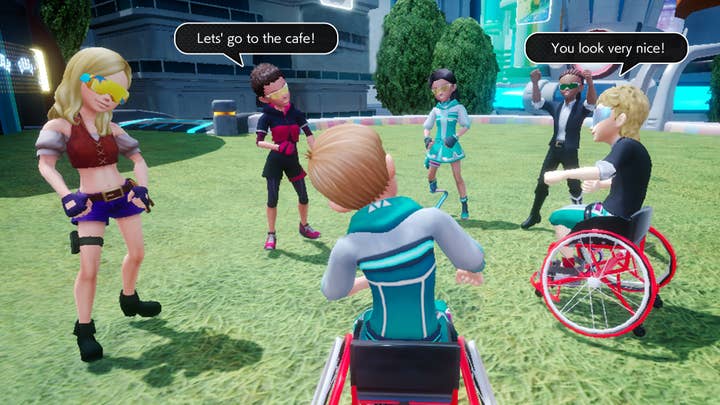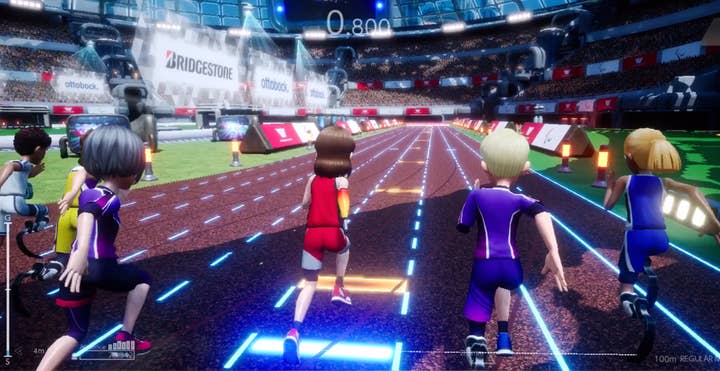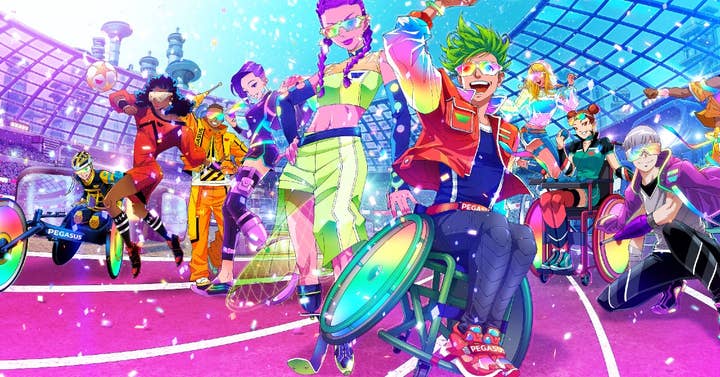The first ever Paralympics video game
Developer JP Games on crafting a sports-centric MMO-style game that finally represents Paralympians' achievements
Yesterday, the 2020 Summer Paralympics drew to a close -- but the event is far from over in the world of video games.
Plenty of our readers will be aware of the Sega-published trio of officially licensed Olympics video games: the more traditional title for consoles and PC, the less traditional but perhaps more prominent Mario & Sonic At The Olympic Games, and a Sonic-only Olympics title for mobile.
What you may be less aware of is the officially licensed Paralympics game, The Pegasus Dream Tour, which launched back in June and hosted its own in-game concert as a closing ceremony over the weekend.
Every instance of the Summer Olympic Games since 1992 -- and even some of the Winter Olympic Games -- have been accompanied by at least one video game adaptation, giving players the chance to go for the gold and virtually achieve something the vast majority of us never could in real life.
"1.2 billion people are considered to have disabilities. With diversity and inclusion becoming the norm in movies and TV , diversity is equally necessary in games"
Yet The Pegasus Dream Tour is the first time fans of the Paralympics have been afforded the same opportunity. Why?
"Although the Paralympics itself has a very high level of recognition, it doesn't quite have as large a fanbase as other gamified events such as the Olympics or the football World Cup," suggests Taeko Yoshimoto, PR manager at the title's developer JP Games.
"Whilst this is only a hypothesis, we think that for many companies it's not something that could be as easily or successfully tackled, especially in terms of sales but we felt we had a really unique proposition to approach the game from."
While previous Olympics games have focused primarily on home consoles, tapping into the demand for core-centre sports games, The Pegasus Dream Tour has been developed with more accessibility, both in terms of controls (more on that in a bit) and audience. Naturally, that means it's on mobile, both Android and iOS, and it's free to play.
"Mobile is one of the largest growing markets in video games and by far the most accessible," says Yoshimoto. "Since the purpose of the game is to promote the appeal of the Paralympics to a large number of people, we chose mobile as the platform in the hope that it would encourage people who have perhaps never played games before to pick it up.
"Many of our target players are not accustomed to using both hands to move their avatars around freely, so we designed the game so that it can be played easily and automatically without the need for advanced techniques."
Herein lies another advantage of mobile. While console Olympics games -- even the Mario & Sonic ones -- often involve dexterous handling of a traditional gamepad, with quick reflexes and perhaps no small amount of mashing buttons as fast as possible, The Pegasus Dream Tour aims to be playable by people of all ages and abilities.

Much of the game is automated, including movement, with players instead focusing on how to improve their chances of winning. This can range from putting their character through training exercises and workouts to ensuring they eat a nutritional diet for more energy. In the sports minigames themselves, they can boost their avatar's performance by tapping the screen in time with bars shown on screen.
"We wanted to convey the fun of the Paralympic Games, but didn't want it to be just a collection of minigames that recreated the competition"
JP Games consulted with Can I Play That, an online games community for people with disabilities, and various influencers with disabilities to get feedback and ensure the experience was authentic. To that end, the developer also frequently consulted with the International Paralympic Committee and even has avatars representing nine real-world athletes in the game.
"In order to learn more about them and the games, we frequently showed the games we were developing to the Paralympic Committee and other athletic organizations and para-athletes, and received their opinions on the content and expressions to ensure accurate representation," says Yoshimoto. "We have also received cooperation from orthotic manufacturers to gain their knowledge on the structure of orthotics."
The orthotics consultations were a big part in enabling players to customise their avatars, not just with hairstyles and outfits but also with wheelchairs and prosthetic arms and legs. It's one of the few instances where even players with disabilities can create a character that more closely represents them, enhanced by the fact you can use a selfie to inform the structure of your avatar's face.
The focus on extensive customisation options is in part because The Pegasus Dream Tour is more than just a typical sports game; it's actually a mini MMO. In between events players can explore the fictional Pegasus City and interact with other players, as well as NPCs. Again, accessibility-centric design means players simply drag their finger across the touch screen to move around and tap options when speaking to people.
Pegasus City is pitched as a sustainable metropolis, one with a clean futuristic look. And, as with most live service games, it will evolve over time, adding new facilities to help players level up their para-athlete.

"We wanted to convey the fun of the Paralympic Games, but didn't want it to be just a collection of minigames that recreated the competition," Yoshimoto explains. "Our goal instead was to create a game experience in the Avatar RPG genre, where players support their avatar and work together with their friends to achieve greatness as para-athletes.
She adds: "Pegasus City is a vision of an ideal city of the future, a city that embodies International Paralympic Committee's philosophy of diversity and inclusion. The city is barrier-free and wheelchair-accessible, and is home to a vibrant community of avatars with many different personalities. By simulating a fictional city where it is normal for avatars with various personalities to live together, we hope that the real world will be able to take a cue from this and help create a society in the future where all personalities are equally respected."
The game launched with two sports, 100m sprint and boccia, with plans for more to be added over time. But even in its most basic version, The Pegasus Dream Tour has achieved something rarely seen in video games: better representation of disabilities. That's something Yoshimoto hopes to see the industry address in the near future.
"We received many comments from players with disabilities that they were very happy to be able to create avatars that reflect the same disabilities they have," She said. "In addition to faithfully reproducing real prosthetic arms, legs, and wheelchairs, we can also create interesting designs that make people proud to wear them. We received many positive comments from people with disabilities saying how cool this level of customisation is.
"According to the International Paralympic Committee, about 15% of the world's population -- or 1.2 billion people -- are considered to have disabilities. With diversity and inclusion becoming the norm in the world of movies and TV dramas, we believe that diversity in the representation of avatars, the player's alter ego, is equally necessary in games. We hope that this game will serve as a springboard point and help encourage the games industry to consider this level of inclusivity during their own game development."

